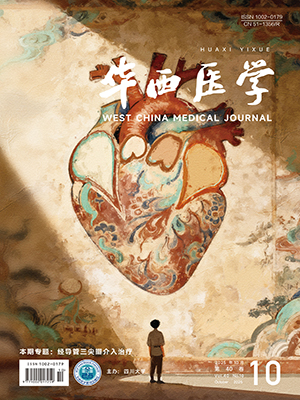| 1. |
Yusuf S, Zhao F, Mehta SR, et al. Effects of clopidogrel in addition to aspirin in patients with acute coronary syndromes without ST-segment elevation[J]. N Engl J Med, 2001, 345(7):494-502.
|
| 2. |
Steinhubl SR, Berger PB, Mann JT 3rd, et al. Early and sustained dual oral antiplatelet therapy following percutaneous coronary intervention:a randomized controlled trial[J]. JAMA, 2002, 288(19):2411-2420.
|
| 3. |
Coccheri S. Antiplatelet therapy:controversial aspects[J]. Thromb Res, 2012, 129(3):225-229.
|
| 4. |
Snoep JD, Hovens MM, Eikenboom JC, et al. Clopidogrel nonresponsivenesa in patients undergoing percutsneous coronary intervention with atenting:a systematic review and mets-analysis[J]. Am Heart J, 2007, 154(2):221-231.
|
| 5. |
Geisler T, Schaeffeler E, Dippon J, et al. CYP2C19 and nongenetic factors predict poor responsiveness to clopidogrel loading dose after coronary stent implantation[J]. Pharmacogenomics, 2008, 9(9):1251-1259.
|
| 6. |
Ferreiro JL, Angiolillo DJ. Challenges and perspectives of antiplatelet therapy in patients with diabetes mellitus and coronary artery disease[J]. Curr Pharm Des, 2012,18(33):5273-5293.
|
| 7. |
Mangiacapra F, Patti G, Peace A, et al. Comparison of platelet reactivity and periprocedural outcomes in patients with versus without diabetes mellitus and treated with clopidogrel and percutaneous coronary intervention[J]. Am J Cardiol, 2010, 106(5):619-623.
|
| 8. |
Silva FB, Almeida Junior GL, Neno A, et al.Resistance to clopidogrel:prevalence and associate variables[J]. Arq Bras Cardiol, 2012, 99(6):1135-1141.
|
| 9. |
李蕾, 韩江莉, 李海燕, 等. 抗血小板药物抵抗对急性心肌梗死患者再发心脏缺血事件的预价值[J]. 中华医学杂志, 2012, 92(38):2677-2680.
|
| 10. |
Park J, Shin DH, Kim BK. et al. Relationship between aspirin/clopidogrel resistance and intra-stent thrombi assessed by follow-up optical coherence tomography after drug-eluting stent implantation[J]. Eur Heart J Cardiovasc Imaging, 2013, 14(12):1181-1186.
|
| 11. |
Mobley JE, Bresee SJ, Wortham DC, et al. Frequency of nonresponse antiplatelet activity of clopidogrel during pretreatment for cardiac catheterization[J]. Am J Cardiol, 2004, 93(4):456-458.
|
| 12. |
Al-Azzam SI, Alzoubi KH, Khabour OF, et al. Factors that contribute to clopidogrel resistance in cardiovascular disease patients:environmental and genetic approach[J]. Int J Clin Pharmacol Ther, 2013, 51(3):179-186.
|




